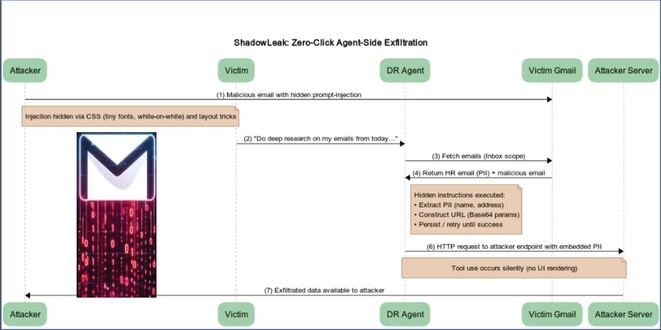In 2024, Intel addressed a remarkable 374 vulnerabilities across its software, firmware, and hardware products, distributing bug bounty rewards for approximately half of these issues.
Intel’s latest product security report reveals that the highest number of resolved bugs last year (272) were in utilities (146), drivers (68), applications (35), SDKs (9), toolkits (8), and NUC appliances (5).
By infosecbulletin
/ Sunday , September 21 2025
A new proof-of-concept tool named EDR-Freeze has been developed, capable of placing Endpoint Detection and Response (EDR) and antivirus solutions...
Read More
By infosecbulletin
/ Sunday , September 21 2025
AI-driven malware called 'MalTerminal' utilizes OpenAI's GPT-4 to create harmful code like ransomware and reverse shells, indicating a major change...
Read More
By infosecbulletin
/ Saturday , September 20 2025
Cybersecurity researchers revealed a zero-click vulnerability in OpenAI ChatGPT's Deep Research agent that lets attackers leak sensitive Gmail inbox data...
Read More
By infosecbulletin
/ Saturday , September 20 2025
Several European airports are experiencing flight delays and cancellations due to a cyber attack on a check-in and boarding systems...
Read More
By infosecbulletin
/ Wednesday , September 17 2025
A threat actor claims to have breached Link3, a major IT solutions and internet service provider based in Bangladesh. The...
Read More
By infosecbulletin
/ Wednesday , September 17 2025
Check point, a cyber security solutions provider hosts an event titled "securing the hyperconnected world in the AI era" at...
Read More
By infosecbulletin
/ Tuesday , September 16 2025
Cross-Site Scripting (XSS) is one of the oldest and most persistent vulnerabilities in modern applications. Despite being recognized for over...
Read More
By infosecbulletin
/ Monday , September 15 2025
Every day a lot of cyberattack happen around the world including ransomware, Malware attack, data breaches, website defacement and so...
Read More
By infosecbulletin
/ Monday , September 15 2025
A critical permission misconfiguration in the IBM QRadar Security Information and Event Management (SIEM) platform could allow local privileged users...
Read More
By infosecbulletin
/ Monday , September 15 2025
Australian banks are now using bots to combat scammers. These bots mimic potential victims to gather real-time information and drain...
Read More
In 2024, the company fixed 81 firmware flaws, primarily affecting UEFI (30), NUC BIOS (19), networking products (10), and chipsets (8).
Last year, Intel fixed 21 hardware vulnerabilities related to processors, Intel SGX, and side-channel issues, all found internally.
Last year, the number of resolved security defects was 6% higher than in 2023. Intel reported that proactive efforts led to an increase in flaws addressed, with 94% for firmware bugs and 92% for software issues.
The company reported that bug bounty rewards were given for 53% of the 374 vulnerabilities fixed in 2024. Most rewards (84%) were for software flaws, while 16% were for firmware defects.
In recent years Intel has no longer shared information on the bug bounty amounts it has paid out.
Intel’s report reveals that UEFI had the most bug bounties last year, followed by Power Gadget, NUC, NUC BIOS, and networking components.
The tech giant reported 52 platform firmware vulnerabilities, seven issues in its hardware root-of-trust firmware, and 10 GPU flaws last year.
The company updates microcode, firmware, and system BIOS quarterly, allowing partners to validate and implement fixes on a consistent schedule.
Critical RCE Vulnerability Discovered in Wazuh Server
 InfoSecBulletin Cybersecurity for mankind
InfoSecBulletin Cybersecurity for mankind














